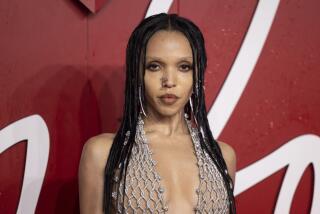Harmonic Convergence : Racial Tolerance Is Suddenly a Hot Topic in Advertising
Bill Clinton didn’t start it. But there are undeniable signs--as the President-elect prepares to take the oath of office Wednesday--that some of America’s biggest marketers are now embracing the same racial-harmony themes that Clinton wove into his campaign speeches and stitched into the fabric of his transition team and Cabinet appointments.
At one time, only apparel companies on the marketing edge, such as Benetton, Esprit and Members Only--and, more recently, Nike--dared to tout race as an issue in ads. But this week, even Clearasil, the acne medication made by merchandising giant Procter & Gamble Co., is about to tackle the topic in TV ads to appear on the classroom network Channel One.
Over the weekend, Mastercard co-sponsored a teen summit in New York City that focused on racism. And McDonald’s ran national TV spots promoting Monday’s Dr. Martin Luther King Jr. holiday. Timberland Shoes, an East Coast boot maker, is also taking on the issue of combatting racism while trying to recruit other marketers to join its battle. And last week, TDI, which sells ad space on buses from Los Angeles to New York City, unveiled in Los Angeles a nationwide public service campaign on improved race relations.
All of this comes at a time when racial issues continue to be front-and-center in the news. In just a few weeks, the four Los Angeles policemen accused of beating Rodney King are scheduled to be tried on charges of violating his civil rights. In the Crown Heights area of Brooklyn, antagonism continues between blacks and Hasidic Jews. Over the weekend, Jesse Jackson continued his attack on racism in professional sports--and threatened a baseball boycott. And in Germany, anti-racist groups have taken to the streets in protest of attacks by right-wing skinheads on ethnic minorities.
Earlier this month, even the chairman of Mercedes-Benz in Germany wrote an “open letter” that ran as an advertisement, harshly criticizing racial intolerance.
Can advertising quell any of this anger? Probably not. But the public relations around it can attract wide attention. By bringing the issue of race to the forefront, many marketers hope that they can attract new attention.
The recent spurt of ads in support of racial harmony represents “a growing recognition of minorities--and of the increasing power they have in this country,” said Roberta Clarke, a professor of marketing at Boston University.
“Sure, you can be cynical and say that marketers are only doing this to make money,” Clarke said. “But if we can get companies to even act as if they respect these ideals, that may be the most we can expect from them. One thing is for sure: Marketers can’t sweep minorities under the rug anymore.”
Racial harmony will be the advertising cause for 1993--particularly for firms trying to tap into the teen-age market, said Marian Salzman, president of the New York research firm BKG Youth Inc. “The only environmental issues that sell will be urban environmental issues,” she said.
A recent survey of teen-agers conducted by BKG for Eastman Kodak Co. revealed that more than a third of those responding said they had been victims of racial discrimination. Only 15% of the teen-agers surveyed said they would “never” date a person of another race. For big marketers, this clearly signals that racial harmony sells.
But some corporate image experts say racial harmony is a marketing fad--and only firms such as Benetton are expected to remain committed to it after other social issues come into vogue.
“There’s quite a difference between developing a whole corporate culture on the issue and, say, Clearasil running an ad about racial harmony,” said Joel Portugal, co-founder of the New York corporate identity firm Anspach Grossman Portugal.
Indeed, executives at Procter & Gamble concede that they became interested in the topic of racial harmony only after it became clear to them--from in-house surveys--how important the issue is to teen-agers. “If it’s important to teens, then it’s important to Clearasil,” said Jim Schwartz, a Procter & Gamble spokesman.
Beginning this week, actress Demi Moore will be featured in a Clearasil-sponsored public service spot against racism that will initially air on Channel One but could eventually land on network television. Noxzema skin cream is also expected to eventually speak to the issue.
Two weeks ago, Timberland Co. of Hampton, N. H., began running a print ad campaign with a large headline asking consumers to “Give Racism the Boot.” The ad is running not only in the United States, but in England, France, Switzerland and Germany--where Timberland does a big business.
Jeffery Swartz, chief operating officer of Timberland, said he was struck with the idea for the campaign shortly after hearing a story from one of Timberland’s senior executives in Germany. The executive, who is black, told Swartz that his 6-year-old son came home from school and asked his father why other children were using racial slurs against him.
Swartz said Timberland “wanted to be on record” with its strong opposition to racism. The ad is the first of five print ads that will appear over the next year. One ad will show a boot under this headline: “This boot performs best when marching against hatred.”
“This is not about selling boots,” Swartz said. “It’s about making a strong statement.”
One of the strongest anti-racism statements of all was unveiled last week in Los Angeles by TDI, the country’s largest transit ad firm. TDI is donating $2.5 million in ad space for racial-harmony messages that will run across bus sides nationwide--including more than 400 in Los Angeles.
The ads, which feature photos of people from various racial backgrounds, include this slogan: “We live in paradise. Don’t destroy.”
“It’s not going to stop a gang member or a graffiti artist from doing whatever they want to do,” said Bill Apfelbaum, president and chief executive of TDI, “but it can certainly raise the consciousness of some people.”
Briefly . . .
The Los Angeles office of Lord, Dentsu & Partners has been handed the $15-million North American ad account for Phoenix-based Best Western International. . . . Inter/Media Advertising of Encino has won the estimated $5-million direct-response media-buying account for Ross Perot’s “United We Stand America” membership drive. . . . Suissa Miller Advertising of Santa Monica has picked up the estimated $2-million China Airlines account formerly handled by DDB/Needham of Los Angeles. . . . AdLand, the San Francisco agency that specializes in marketing to Asian Americans, has been hired by Motorola Corp. to help market to Asian Americans nationwide. . . . Cliff Einstein, president and creative director of the Los Angeles agency Dailey & Associates has been named “1992 Leader of the Year” by the Western States Advertising Agencies Assn. and will be honored at a black-tie dinner Feb. 24 at the Regency Beverly Wilshire Hotel.
More to Read
Inside the business of entertainment
The Wide Shot brings you news, analysis and insights on everything from streaming wars to production — and what it all means for the future.
You may occasionally receive promotional content from the Los Angeles Times.










